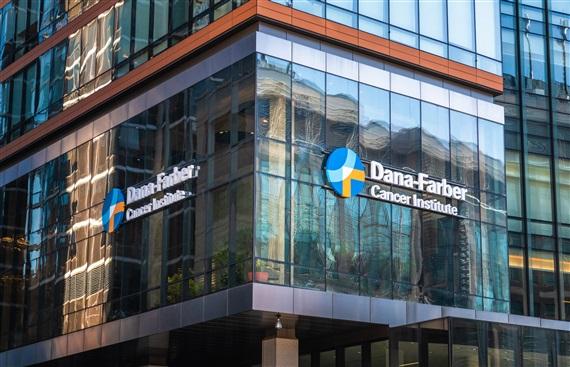Dana-Farber announces expanded joint research agreement with Novartis
This 30-year collaboration is unique in its longevity and open scientific exchange.
Aiming to accelerate the translation of scientific discoveries into improved cancer therapies, Dana-Farber Cancer Institute and Novartis have renewed a longstanding research collaboration and – for the first time – are inviting grant applications from a broad range of Boston academic medical institutions. Under this renewal, more than $11 million will be available annually for research funding through the Dana-Farber/Novartis Drug Discovery and Translational Research Program (DDTRP).
The collaboration, which began in 1992, brings together scientists from Dana-Farber and Novartis to work on drug discovery and development efforts and has supported more than 700 research projects since inception.
“Typically, academia and industry have shorter term agreements, but this collaboration is notable not just for its longevity. In addition, the open scientific exchange over the course of more than two decades has been critical to helping solve difficult problems in ongoing drug discovery,” said William Hahn, MD, PhD, Chief Operating Officer, Dana-Farber.
"Innovation today is so highly democratized,” said Jay Bradner, MD, President of the Novartis Institutes for BioMedical Research. “By opening this long-standing research collaboration to new cancer research institutions, we hope to bring the collective scientific might of Boston’s vibrant medical ecosystem to bear on key challenges in cancer therapeutic discovery.”
With the renewal of the agreement, Novartis is continuing to support the development of transformative medicines to address current and future needs in cancer care.
The Request for Applications was issued in December 2020 and funding begins in July 2021, with up to 50 percent of the funding supporting projects outside of Dana-Farber. Grant awards are typically in the range of $250,000 per year for three years to individual laboratories, but larger amounts are possible for bigger projects including those from collaborative teams. Grant applications are now solicited from institutions affiliated with Dana-Farber/Harvard Cancer Center (DF/HCC), including Beth Israel Deaconess Medical Center, Boston Children’s Hospital, Brigham and Women’s Hospital, Massachusetts General Hospital, Harvard Medical School, and the Harvard School of Public Health as well as the Broad Institute of MIT and Harvard.
In this current DDTRP cycle, investigators are encouraged to focus on specific areas in which Novartis scientists are currently working. They include:
- Novel computational and/or experimental approaches to identification of novel cancer vulnerabilities.
- Insights defining a path to drug discovery for well-validated cancer targets that are difficult to drug.
- Clinical and translational studies of established and novel cell and gene therapies.
- Strategies to detect, monitor, and treat minimal residual disease.
The scientific collaborations and insights derived from this program over the last three decades have been plentiful, resulting in significant publications and critical advancements in cancer drug discovery and development.
“Academia and industry play complementary roles, and both are integral to bringing new therapies to patients, which is why this long-standing agreement with Novartis is so important to our mission.” said Kevin Haigis, PhD, Chief Scientific Officer, Dana-Farber.
A notable example of a drug that emerged from the collaboration is Rydapt (midostaurin), which was approved by the Food and Drug Administration in 2017 as the first targeted therapy to treat — in combination with chemotherapy – acute myeloid leukemia (AML) in patients whose cancer cells carry a specific mutation called FLT3. Novartis scientists sent a panel of receptor tyrosine kinase inhibitors with untested FLT3 inhibitory activity, including midostaurin, to the Dana-Farber research group headed by James Griffin, MD, in 2000. Laboratory testing showed that one of these drugs, midostaurin, potently inhibited the FLT3 mutation and blocked the growth of AML cells containing this mutation. These findings led subsequently to a series of clinical trials including the RATIFY global phase III randomized clinical trial which showed that the addition of midostaurin substantially improved survival in newly diagnosed patients, leading to approval of Rydapt.
Another discovery fueled by this collaboration could advance the treatment of triple-negative breast cancers, which are notoriously resistant to approved therapies, including the new drugs known as CDK4/6 inhibitors. A team led by Piotr Sicinski, MD, PhD, of Dana-Farber showed that a subset of triple-negative breast cancers depends on the CDK4 and 6 cell-cycle proteins but are resistant to CDK4/6 inhibitors such as palbociclib and ribociclib because the drugs are swallowed up by tiny, membrane-enclosed structures called lysosomes that store and digest parts of cells. Thus, the drugs don’t reach their targets in the breast cancer cells.
In laboratory experiments, Sicinski and Anne Fassl, PhD, in his lab with the help of colleagues from Dana-Farber, Novartis, Harvard Medical School, the Broad Institute of MIT and Harvard, and other institutions, showed that triple-negative breast cancer cells have a large number of lysosomes, which sequester CDK 4/6 inhibitor drugs and cause resistance to therapy. The investigators tested several strategies for counteracting this resistance mechanism, including developing novel CDK4/6 inhibitors that escaped lysosomal sequestration and showed “markedly improved efficacy against triple-negative breast cancer cells as compared to all existing FDA-approved compounds.”
In the most recent cycle (2018-2020), the program funded 23 proposals. In one finding that resulted from this cycle, Dana-Farber scientists led by Michael Eck, PhD, obtained structural snapshots of the BRAF kinase — providing a foundation for understanding normal BRAF regulation and its mutational disruption in malignant melanoma and other cancers.
Media Contacts
If you are a journalist and have a question about this story, please call 617-632-4090 and ask to speak to a member of the media team, or email media@dfci.harvard.edu.
The Media Team cannot respond to patient inquiries. For more information, please see Contact Us.
